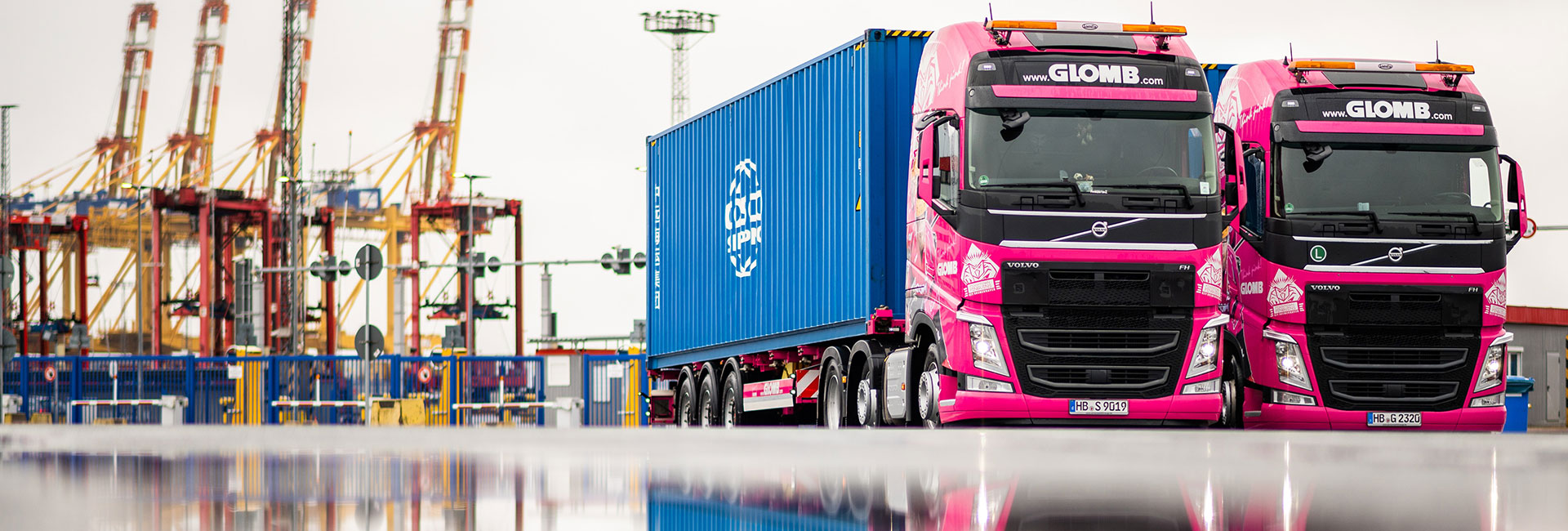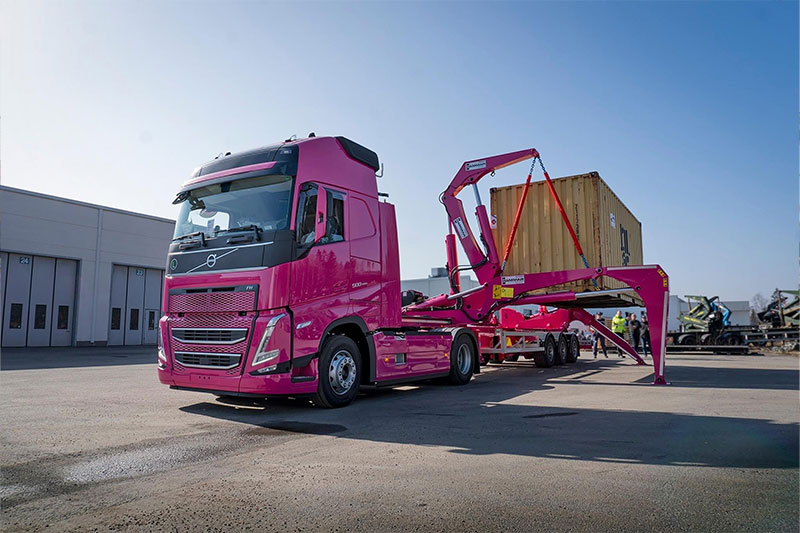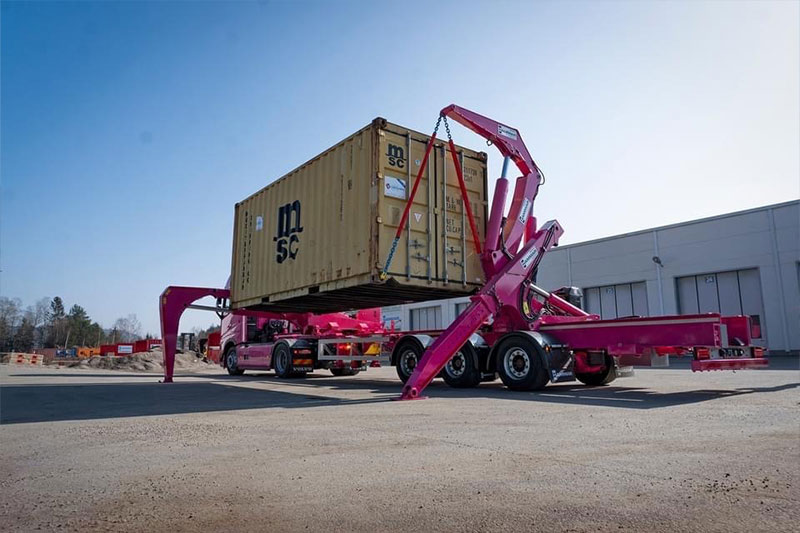
In Germany’s largest port, forwarder GCD Glomb’s striking pink trucks are hard to miss. That’s not just a matter of the fluorescent livery that founder Sigward Glomb senior first introduced as a protection against theft in ports then without any security staff. The main reason for their presence is that the Bremerhaven-based company specializes in shipping sea containers and is therefore regularly on the move to and from Hamburg, Bremerhaven and Bremen in the ‘wet triangle’. “
The Port of Hamburg is of immense importance for us,” stresses Sigward Glomb junior, Joint CEO with his brother Matthias of the company specializing in container transport, founded by their father Sigward Glomb senior. in 1980. The company’s annual turnover is now around 30 million euros. Along with short haul traffic – including port tours accounting for around 20 percent of its business - domestic German long-haul traffic with the Port of Hamburg accounts for around 80 percent.
Smooth processes in the Port of Hamburg are therefore of great importance for Glomb, any additional effort costing time and money. When the slot booking procedure, including a quotas system - was introduced at the end of 2017 to reduce waiting times, Glomb was among the many sceptical forwarders. They were primarily thinking of the additional work and administrative effort this would cause for logistics companies.
In addition, the number of no-shows, or containers booked but not then delivered, rose sharply: “Some forwarders booked as many time windows as possible to be able to react flexibly with their vehicles,” stresses Sigward Glomb junior. “They were at the same time blocking other forwarders.” This sometimes made slots hard to obtain – even for a forwarder like Glomb that makes no dummy-bookings of this kind.

Yet the situation has meanwhile improved. “With tour planning, there are fewer problems in delivering the container, because whether all the essential documents for delivery or collection are available has been established in advance,” stresses Glomb. “That’s a good thing.” Many forwarders have long been convinced that such a procedure fundamentally makes sense, being indispensable for generally improved coordination of rising cargo volume per vessel, as well as the truck calls. “Time windows also of fer the advantages that many problems can be sorted out in advance,” reports Glomb. Yet forwarders are also requesting a further improvement in the form of increased transit time for trucks at the terminals, plus availability of more time windows.
The Bremerhaven-based forwarders operate with 60 of their own trucks, including five low-loaders, 120 container chassis and around 200 vehicles from sub-contractors. Like terminal operators HHLA and Eurogate, they are continually striving to make container transport more efficient and sustainable. At the turn of the year 2021/2022, for example, the company almost completely digitalized its bookings file. With the aid of electronic fleet management, track & trace and complete electronic booking transmissions, including status reports for the customers – primarily shipping companies, seaport forwarders and transhipment companies – Glomb can present boxes as punctually as possible at the loading point, proactively notifying customers.
Finally, this family business needs to handle import and export bookings reliably and flexibly for tramp ships, often at short notice. “Since the pandemic, however, ‘turbulent times’ have set in,” reports Glomb. “Virtually no ship arrivals can be planned, and on imports, especially, dates are frequently put back at short notice. Especially with those at weekends, that’s a real challenge.”
Yet currently scarce cargo capacities have caused something of a change on the customer side: “You realize how hard it is to obtain truck capacity and how high fuel prices have risen. Furthermore, freight costs for the land route are only a fraction of those for sea freight.” Unlike the situation previously, higher costs can therefore be passed on: “The thinking has completely changed,” stresses Glomb.
„For us
the Port
of Hamburg
very important"
In challenging times, the invariably high status of the 170 staff in this family business counts for more than it usually would. Glomb accordingly still relies on its own upcoming generation, annually training between three and five truck drivers, and five to seven office In challenging times, the invariably high status of the 170 staff in this family business counts for more than it usually would. Glomb accordingly still relies on its own upcoming generation, annually training between three and five truck drivers, and five to seven office staff. “By acquiring especially good trucks with powerful engines, for example, we try to secure good working conditions for our roughly 85 drivers,” reports Glomb. “Equally important is appropriate remuneration, which over the last ten years has risen by around 30 percent.”
In-company and vocational training for drivers are a further important aspect: “We voluntarily meet the costs for the five training modules required every five years for the extension of driving-licence validity.” As part of the system of premiums drafted by the forwarder, drivers are rewarded with 200 euros per month for working presciently and conserving energy. To save fuel and protect the environment, Glomb has electronically limited the maximum speed of its trucks to 82 kilometres per hour. “Many welcome that because they find driving more relaxed with a less frequent need for overtaking manoeuvres,” reports Glomb.
When acquiring new vehicles, Glomb is also paying a great deal of attention to alternative fuels: “Originally, I was thinking primarily of LNG. Yet the current move ment of prices means that liquefied gas is currently no longer economic. Battery-electric propulsion systems, however, are of interest for city centres and port tours – we are closely examining these just now.” ‘A handful of vehicles’ is one possibility. A few questions remain to be clarified, in respect of commercial viability, potential for loading, and subsidies.
Glomb also aims for another step forward, on the IT side: “We are thinking just now of software for the company that would entail a complete transformation of all in-house IT and telematics,” says Glomb. “Yet this is like open-heart surgery, needing to be well planned.” As logistics people are aware, digitalization offers both tremendous opportunities, and challenges. There’s only one option in the last resort, as Franz Kafka realized: ‘Paths are made by walking.

In 2021 GCD Glomb Containerdienst transported 254,200 TEU. The following equipment is available: Reefer chassis, multi chassis, 45-ft multi-chassis, platforms, tank chassis, chassis for rolling trailers, 20-ft and 40-ft tipper chassis, two-axle low-bed trailers, three-axle low-bed trailer, three-axle, five-axle and eight-axle semi-low-bed trailers plus BF2s and BF3s - second-and third-generation vehicles. Absolutely new and in Germany – unlike Sweden – a USP for us is a side loader that without any ramp can independently collect/deposit containers at the customer’s.